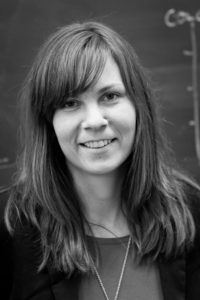 Marlene Ågerstrand is an Assistant Professor at the Department of Environmental Science (ACES) at Stockholm University. She received a PhD from the Royal Institute of Technology in Stockholm in 2012, and did a post doc at Stockholm University 2012-2016. Her research concerns regulatory (eco)toxicology, with a focus on the assessment and management of chemicals. Aspects of interests include the use of expert judgment and science in hazard and risk assessments. The aim of her work is to improve the understanding of the decision-making process in chemicals regulation.
Marlene Ågerstrand is an Assistant Professor at the Department of Environmental Science (ACES) at Stockholm University. She received a PhD from the Royal Institute of Technology in Stockholm in 2012, and did a post doc at Stockholm University 2012-2016. Her research concerns regulatory (eco)toxicology, with a focus on the assessment and management of chemicals. Aspects of interests include the use of expert judgment and science in hazard and risk assessments. The aim of her work is to improve the understanding of the decision-making process in chemicals regulation.
Read Marlene Ågerstrand’s Emerging Investigator Series article “Use of behavioural endpoints in regulation of chemicals” and read more about her in the interview below:
Your recent Emerging Investigator Series paper focuses on use of behavioural studies in chemicals regulation. How has your research evolved from your first article to this most recent article?
I started my career evaluating the importance of voluntary environmental initiatives from the pharmaceutical industry, and then moved on to evaluating chemicals regulation. Through various collaborations throughout my career I have had the opportunity to broaden my knowledge and research field. Currently, I look forward to continue the collaboration with the group of ecologists and ecotoxicologists I meet when writing this paper on the use of behavioural studies in chemicals regulation. It has been extremely rewarding to be introduced into this research field. It is such a privilege to have a work that constantly offers the opportunities to learn new stuff, and animal behaviour is such a fascinating field.
What aspect of your work are you most excited about at the moment?
I have two PhD-students that are starting just now and I look forward to working with them. They both have valuable experiences from experimental work and human health assessments that I think will benefit our joint projects. We will continue evaluating the European chemicals regulation, focusing for example on the REACH regulation. When doing my PhD I had a really supportive supervisor and I look forward to developing my tutor skills.
In your opinion, what are the most important questions to be asked/answered in this field of research?
Research on regulation of chemicals has largely focused on how science is used in decision-making but we also know that other factors, like value judgements and economic considerations, can influence how decisions are made. To fully address and understand the complexity of decision-making natural science researchers need to collaborate with social science researchers. I look forward to doing that.
What do you find most challenging about your research?
Since my research to a large extent is based on literature studies, lack of transparency in the regulatory system is a limiting factor. One of my overarching research goal is to understand how science is used, or not used, in decision-making. If hazard and risk assessments (i.e the basis of chemicals management) and the underlying studies are not publicly available it limits the possibilities to perform the research. But I sense that change is coming. Everywhere in society we see demands for increased transparency, and also in this field.
In which upcoming conferences or events may our readers meet you?
I usually attend the SETAC Europe meeting but I will unfortunately not go to the meeting in Dublin. I am trying to reduce my CO2-emissions so flying is not an option at the moment. I have travelled by train to several meetings in Europe and it works surprisingly good so I will stick to that for a while. It helps to have a department that supports environmental friendly choices, e.g. by paying the difference between the flight ticket and the train ticket.
How do you spend your spare time?
With family and friends, preferably doing outdoor activities. Climbing, orienteering, mountain biking, cross-country skiing and skating are preferred sports. Eating Vietnamese food is also prioritized. I have always prioritized my spare time (and sleeping) and I think that has been important for my health and thereby my continued career in academia.
Which profession would you choose if you were not a scientist?
I need to feel strongly motivated to do a good job, so if I worked outside academia it would have to be something within sustainable development. We only have one planet.
Can you share one piece of career-related advice or wisdom with other early career scientists?
The best thing I did in my early career was to start networking. It has opened so many doors and resulted in interesting and rewarding research collaborations. I also think it has contributed to making my research more relevant for stakeholders, and thereby increased the societal impact of my work. I started by attending meetings, emailing people I wanted to get to know, and organising sessions and other events. This is time-consuming in the beginning but after a while it gets self-generating and you can enjoy the fruits of your labour.










